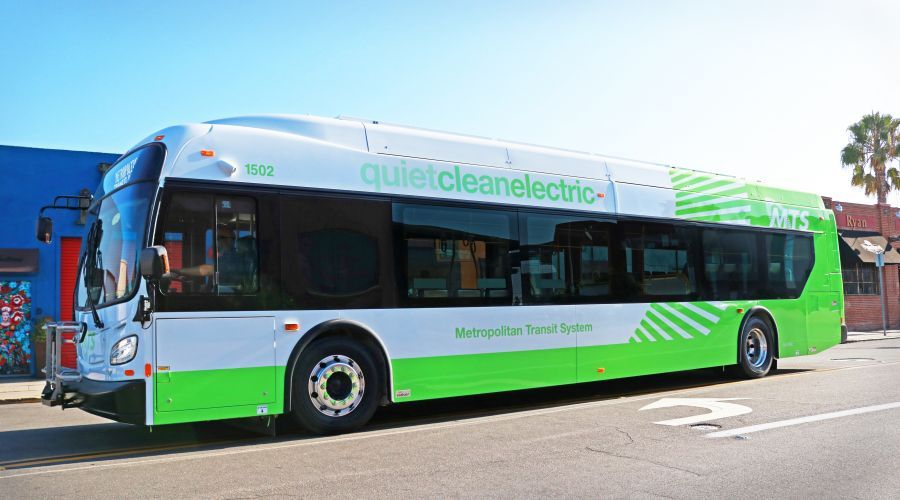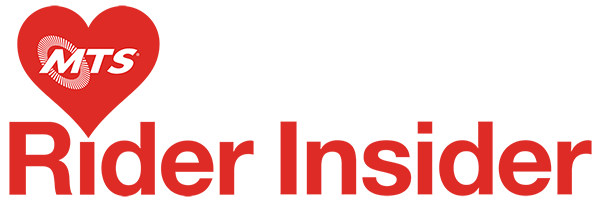
San Diego, CA – The San Diego Metropolitan Transit System (MTS) is launching a pilot program of Zero-Emissions Buses (ZEB) that run on electric battery power. The vehicles are first-of-their-kind in the region and represent the next leap forward in the transit agency’s leadership in providing connected communities, cleaner air and less traffic.
MTS has acquired six New Flyer Xcelsior Charge battery electric buses. Their use cuts tailpipe emissions by 100 percent, immediately improving air quality and helping the region achieve climate action goals.
The pilot program begins Nov. 4 with testing on multiple routes around San Diego. Following several weeks of route validation, the buses will go into passenger service in late November.
“Our new electric buses represent a strong step forward to a greener, cleaner and better connected transit system in San Diego,” said San Diego County Supervisor Nathan Fletcher, who is Chairman of MTS and also serves on the California Air Resources Board. “The leadership of MTS should be applauded as we take new technologies and push us towards a greener future.”
Today, MTS’s 40- and 60-foot fixed route buses are fueled by compressed natural gas (CNG). State regulations require public transit agencies to gradually transition to all-ZEB fleets by 2040. MTS is preparing for that mandate by initiating this pilot program, which allows MTS staff to analyze vehicle performance under various conditions and train drivers on the most efficient driving habits.
“Our focus is on providing the highest level of service for our riders and achieving the maximum return on our investments,” said MTS Chief Executive Officer Paul Jablonski. “Getting these buses on the roads will immediately improve the air quality in the communities we serve while arming us with the performance data and operational insights necessary to build an effective transition plan.”
The electric buses have an average estimated range of 150 miles per charge. Range is dependent on many factors, including driving characteristics, weather, topography and more. Many MTS bus routes are 150 miles or less, making them appropriate for this pilot program. MTS is currently planning to begin pilot testing on Routes 1, 2, 4, 10, 13, 815, 905 and 936, though the test routes may change and expand during the course of the pilot program. After 18 months of testing and modeling, MTS will have an accurate and holistic picture of the operational realities to present to the MTS Board as the agency develops a road map to transition to a full zero-emissions fleet.
“MTS’s new Zero-Emissions Bus Pilot Program is a truly significant step forward towards a cleaner, greener San Diego,” said Climate Action Campaign Executive Director Nicole Capretz. “Accessible, clean transit is a cornerstone of climate ready and climate safe communities and I’m thrilled to see this powerful new technology on the streets of San Diego.”
This Zero-Emissions Bus Pilot Program is the latest example of how MTS is protecting the environment and reducing regional greenhouse gas emissions through the use of clean technology. MTS already operates 128 zero-emissions trolleys serving the region’s riders every day. For its bus fleet, MTS was among the first transit agencies to convert to CNG fuel, deploy near-zero emission engines and purchase 100 percent renewable biogas.
The new buses include the newest on-board video surveillance systems, enhanced wheelchair restraint systems with forward-facing safety barriers, and fully electric air conditioning and engine coolant systems. Additionally, the new buses will be noticeably quieter.
The Board-approved budget for the pilot program is $12.5 million, including a combination of bus and infrastructure costs, and design/consulting/project management expenses. This pilot program is funded by the combination of a Caltrans grant, California Air Resources Board (CARB) offsets, funding from the state’s Low Carbon Transit Operations Program and its Hybrid and Zero-Emission Truck and Bus Voucher Incentive Project, as well as the MTS Capital Improvement Program.
MTS operates 95 bus routes and three Trolley lines on 53 miles of double-tracked railway. Every weekday, 300,000 passenger trips are taken on MTS bus and Trolley services in 10 cities and unincorporated areas of the county. In FY 2019, MTS served approximately 86 million riders. For more information on how you can use public transportation and save money, go to www.sdmts.com.
###
